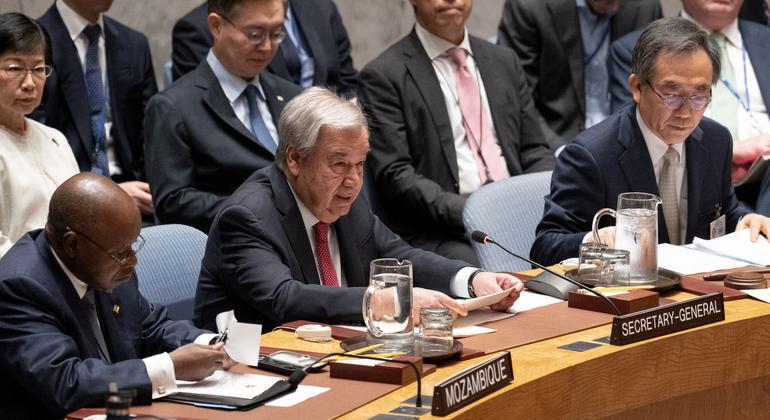UN chief warns of ‘cyber mercenaries’ amid spike in weaponization of digital tools

At one Security Council high level debate about growing threats in cyberspaceconvened by the Republic of Korea, Council President in June, Mr. Guterres underlined the transformative power of digital technology.
“Breakthroughs in digital technology are happening at breakneck speed; Digital advances are revolutionizing the economy and society,” he said.
“They are bringing people together, providing citizens with access to government services and institutions, and promoting economic, trade and financial inclusion.”
However, he warned that the seamless and instantaneous connectivity that delivers these benefits also leaves people, organizations and countries vulnerable.
“The danger of weaponizing digital technology is growing every year,” he warned.
“Malicious activity in cyberspace is increasing by State and non-State actors as well as outright criminals.”
Cyber mercenary, cyber attacker
The UN chief warned that malicious cyber activities are on the rise, with serious cyber security incidents becoming “worryingly common”.
Essential public services such as healthcare, banking and telecommunications are regularly breached, and criminal organizations and “cyber mercenaries” engage in relentless illegal activities.
In addition, an “army of hate merchants” is spreading fear and division online.
“So-called civilian ‘hacktivists’ are joining the fight and in many cases are blurring the lines between combatants and civilians,” he said.
New vulnerability
Integrating digital tools with weapons systems, including autonomous systems, introduces new vulnerabilities, Guterres said.
The abuse of digital technology is becoming more sophisticated and stealthy, with the proliferation of malware. The threat is further amplified by artificial intelligence (AI) enabled cyber operations.
The United Nations head emphasized: “Ransomware is a typical example, a major threat to public and private organizations as well as the critical infrastructure that people depend on.”
In 2023, ransomware payments totaled $1.1 billion.
In addition to financial costs, malicious cyber activities undermine public institutions, electoral processes, and online integrity, eroding trust, fueling tensions, and sowing the seeds of violence and conflict. , he added.
Incredible opportunity
Despite the threats, Mr. Guterres emphasized the “incredible opportunity” that digital technology offers to create a more just, equitable, sustainable and peaceful future.
He called for breakthroughs towards the common good, highlighting his proposals New agenda for peace places prevention at the core of all peace efforts.
“It calls for the development of robust frameworks consistent with international law, human rights and uncharted and focus the efforts of all nations to prevent the expansion and escalation of conflicts in and through cyberspace,” he said.
“As reflected in the New Vision for the Rule of Law, the rule of law must exist in the digital realm as well as in the physical world.”

The United Nations Security Council meets to discuss growing threats in cyberspace.
Call for better integration
Secretary-General Guterres welcomed the commitment to action by the General Assembly, including the working group dedicated to information and communications technology (ICT) security.
He also called on the Security Council to integrate cyber-related considerations into its work and resolutions, stressing that many of the issues it addresses, such as the protection of civilians, peace operations , counter-terrorism and humanitarian activities, are all affected by cyberspace.
“Incorporating this into your discussions will be a useful way to lay the groundwork for more effective answers to this important question,” he said.
Future Summit
In conclusion, Mr. Guterres emphasized the importance of the upcoming Future Summit in September.
“The treaty that will be launched after the summit represents an important opportunity to support the maintenance of international peace and security in cyberspace,” he said.
Among other actions, it aims to protect critical infrastructure against harmful IT activities and improve accountability for data-driven technology, including AI.
The Secretary-General concluded: “I look forward to working with this Council, the General Assembly and all Member States to ensure that technology is focused where it belongs: for progress and security. security of all people and the planet we share.”




